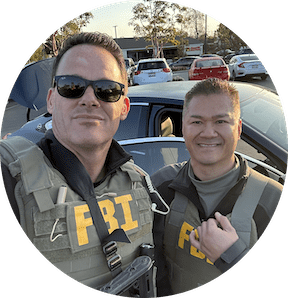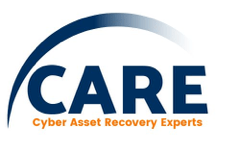Law Enforcement Liaison
Having a law enforcement liaison to understand how law enforcement thinks is imperative in getting them to take your case.

Law Enforcement Needs CARE's Help
You have contacted local law enforcement or the FBI and been advised to report your crime to the FBI’s Internet Crime Complaint Center at https://ic3.gov. You did as you were told but weeks have gone by and nobody has called you back. What is going on?
Similarly, let’s say you report your crime to local law enforcement and they provide you a case number, does that mean your case is going to be investigated. Unfortunately, it doesn’t. After a police officer or deputy takes your report and gives you a case number, often it takes a week to a month to be routed to their Detective Bureau where a decision is made as to what will be done with it. Often times after waiting a month, they will tell you to file your complaint with IC3.
The clock is ticking as you are waiting for help and meanwhile, your stolen funds are moving through a money laundering network. At some point, your funds will be gone even with law enforcement’s help. In this world, speed is everything.
Real Pig Butchering Victims
Cyber Asset Recovery Experts knows these two victims in these videos. What happened to them is horrible but unfortunately, typical. CARE was started to help victims of these type of crimes overcome the significant hurdles in front of them.
Law Enforcement Liaison FAQs
I reported my case to the police, how long does it take to be assigned an investigator?
After reporting your case to local law enforcement, it can take up to a month before your report to make its way to an Investigator. Think about what is happening to your stolen funds during that month while you are waiting for a call back from an Investigator, assuming they even take your case.
Why is everyone telling me to file an ic3.gov complaint if the FBI isn't going to do anything for me?
For local law enforcement, they simply don’t know the FBI is most likely not going to investigate your case after you report it to ic3.gov. They truly believe they are sending you to the right law enforcement agency to handle your matter. Further, local law enforcement typically doesn’t believe they can do anything for you being the criminal actors are overseas; remember, their primary goal is the arrest the wrongdoers. What they don’t know is they can help you immensely by simply focusing on the seizure of your stolen assets. This is precisely what CARE does for you. We interact on your behalf with local law enforcement to provide the reality of federal law enforcement and provide them with the evidence they need to act on your behalf to recover your stolen funds.
What I should do now?
You have probably reported your case to ic3.gov and local law enforcement and getting no help whatsoever. You can wait to see if things change but remember your funds are presently being laundered. Your next decisions are critical to your future so weigh your options carefully. If CARE makes sense for you, please contact us as soon as possible to increase the chances of recovering your funds.
What is the FBI's Internet Crime Complaint Center and how is a case opened?
According to ic3.gov’s website, “the mission of the Internet Crime Complaint Center is to provide the public with a reliable and convenient reporting mechanism to submit information to the Federal Bureau of Investigation concerning suspected Internet-facilitated criminal activity and to develop effective alliances with law enforcement and industry partners. Information is analyzed and disseminated for investigative and intelligence purposes to law enforcement and for public awareness.” As complaints come into ic3.gov, a decision is made whether or not to create a “Guardian” (the lowest investigation level in the FBI with limited investigative avenues) and pass the information to an investigative squad. Typically, a very low percentage of ic3.gov complaints are even converted to a Guardian. When a FBI White Collar Squad Supervisor receives that Guardian, he has sole discretion as to whether he will assign the Guardian to a Special Agent to investigate. Once a Special Agent receives the case, he or she will contact the United States Attorney’s Office to see if they will open a Grand Jury case so the Special Agent can obtain subpoenas. Federal Prosecutors typically have loss thresholds before they open a Grand Jury investigation. In Los Angeles, that threshold is generally over 2 million dollars. Federal Agents and Prosecutors are decent, hardworking people. The true problem is there are not enough of them to investigate the overwhelming amount of cyber cases so they have to make tough decisions based on their limited resources. The portrayal of FBI Special Agents on TV is they work all day and all night on their cases. That is simply not true. These honorable people have spouses and children just like you so it’s unreasonable to expect them to work all hours of the day and night.
What does law enforcement feel about Private Sector Tracing Companies?
The answer to this question is mixed. Historically private sector companies have provided incorrect tracing reports which has ruined their credibility with law enforcement. Further, several scam tracing companies have emerged to further victimize already hurting victims. Needless to say, this is infuriating to law enforcement. Others in law enforcement feel victims should not have to pay for Crypto Tracing companies. CARE agrees victims should receive help from law enforcement without having to pay for it.
The reality is most victims are not getting the help they need from the government so companies like CARE are necessary to combat these type of crimes as long as they do their work correctly. Law enforcement investigators receive paychecks and the resources, such as crypto forensic software, to investigate their cases. Private sector companies must pay their employees and obtain expensive software licenses to conduct this type of work which is why they have to charge for their services. CARE seeks to keep our prices as low as possible for victims who have been severely damaged by these type of crimes.
Does CARE guarantee the return of my funds?
Unfortunately no. There is no way for CARE to know what happened to your money without doing the work. So should you just accept your money is gone and move on? Once again, that is a personal decision. CARE exists to do everything possible to increase the chances of you getting some of your stolen funds returned to you. If any private company tells you something different, they are lying and probably a scam.









